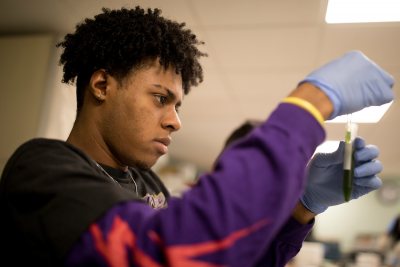Mission Statement: Fostering Inclusivity and Success in Biology

Martin Kruse is an Associate Professor of Biology and Neuroscience. Learn more about his work and research projects for students in his lab here.
Our mission is to provide an outstanding, comprehensive undergraduate program in the life sciences within the context of a liberal arts education. We prepare students for future careers in the life sciences, to understand biological issues, and to apply scientific thinking throughout their lives. Our program promotes the development of problem-solving, writing, quantitative, and critical-thinking skills through inquiry-based studies and mentored research. Faculty accessibility to students is a priority, and we offer small classes, labs, and research experiences that promote student and faculty interaction. We seek to increase the participation and high achievement of all students. Members of the department have passionately engaged in learning and thinking about student success at all levels of our curriculum.
Our curriculum is organized around these shared values. We offer introductory courses – open to any Bates College student – that provide in-depth coverage over a broad range of topics. Our core introductory biology curriculum helps all students explicitly build identity and belonging in STEM, provides flexible pathways into the biology major, and strives to reduce inequities created by differentially resourced high schools. The core curriculum is built around two course-based undergraduate research experience (CURE) courses which create early opportunities for all students to conduct authentic research, a practice that is also known to create inclusion in STEM, and to develop their sense of identity as scientists. Courses for majors build essential skills and incorporate collaborative investigative laboratory studies. Upper-level electives and mentored research opportunities span all sub-disciplines and all levels of biological organization, and provide avenues for the pursuit of the specialized interests of majors and students in interdisciplinary programs. Upper-level students have opportunities to serve as teaching assistants and peer learning assistants. To emphasize collaboration in addition to independent intellectual growth, a required senior capstone experience can be fulfilled by completing a year-long senior seminar in addition to a single-semester thesis. We regularly examine our curriculum and policies as well as data about student experiences to inform revisions to our grading practices, courses, lab/field experiences, and student research opportunities.
